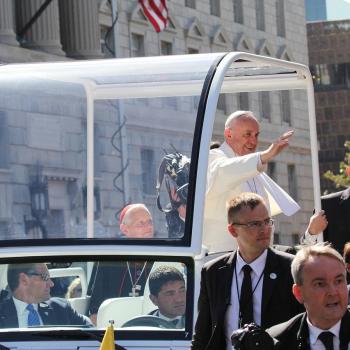THE QUESTION:
Would proof that intelligent life exists on distant planets overturn the Christian religion?
THE RELIGION GUY’S ANSWER:
Religious skeptics say very likely yes. Why? They argue that given the unimaginably vast number of planets throughout space, there seem to be heavy odds that life would have evolved on some or many of them. If so, we earthlings no longer stand at the center of God’s plan for the cosmos, and that overturns the biblical viewpoint.
No, according to the consistent view of Christian thinkers who’ve pondered this since ancient times. The Bible naturally focuses on homo sapiens, not theoretical species elsewhere.
Space is red hot just now. It’s Roswell 1947 all over again. The latest fuzzy videos and reports from the Pentagon suggest something may be going on up there that’s not merely the stuff of science fiction novels. Are we no longer alone in the universe? Are aliens from another galaxy spying on us from those UFOs (Unidentified Flying Objects)? Is SETI (the Search for Extra-Terrestrial Intelligence) poised for its devoutly desired breakthrough?’
Even strict Bible literalist Ken Ham of Answers in Genesis sees a chance because “the Bible does not state whether life exists elsewhere in the universe,” though he “strongly” suspects it does not.
University of Rochester astrophysicist Adam Frank pooh-poohs the current UFO buzz because the real story is that super telescopes may well bring us proof of life by other means, for instance spotting light gleaming on the dark sides of distant planets. He also poses a common-sense objection. If we’re really being visited by aliens “why don’t they just land on the White House lawn and announce themselves?”
That “I” in SETI is all-important. There’s only mild excitement about microbes or simple organisms or life-giving water elsewhere in space. What interests most people is whether conscious beings like us exist beyond our solar system capable of the technological skill to reach out and communicate with humanity.
The noted 20th Century British literary scholar C.S. Lewis, a Christian whose works included space fantasies, addressed these scenarios in the 1958 Christian Herald article “Will We Lose God in Outer Space?,” retitled “Religion and Rocketry” in his 1960 anthology The World’s Last Night. (See https://www.cslewis.com/religion-and-rocketry/.)
He wisely observed that “those who do not find Him [God] on earth are unlikely to find Him in space.” To Lewis faith is unshaken by the possibility there are other lives on other worlds. He was more interested in speculating on this: If there are other spiritual beings like ourselves somewhere, are they also, like us, “fallen”? Have they been granted or denied salvation through Jesus Christ? Does God have other forms of redemption unknown to us? Or did God even create the vast distances of space to quarantine unfallen races from us troublesome humans?
Heavy and fascinating ideas to think about.
Cameron Hilditch reviewed pertinent history on this May 30 for www.nationalreview.com. Even with crude telescopes by modern standards, ancient scientists like Ptolemy were well aware that we inhabit one little planet in a vast realm of stars and planets. His contemporary, the pioneering Christian theologian Origen (circa A.D. 185 – 254), assumed that the universe is populated by many unknown intelligent beings and supposed that they’d have greater powers than we exercise.
The idea of Earth’s and humanity’s centrality was as much the product of Aristotle and other pagan Greeks as of Jewish and Christian thought. That outlook was refuted by the 6th Century theologian John Philoponus, who also argued against the apparent changelessness of heavenly bodies and proposed that there is one Creator so his rational laws operate throughout the cosmos.
The high medievalist Thomas Aquinas pondered non-human persons. By the 15th Century, theologian Nicholas of Cusa would declare, “We surmise that none of the other regions of the stars is empty of inhabitants.”
Why, then, would anyone suppose that believers, ancient or modern, would be thrown by extraterrestrials? Hilditch sees this as the result of the Enlightenment, which celebrated freedom from beliefs and values inherited from the past. He agrees with the non-religious Ezra Klein, who wrote in The New York Times that fellow “materialists” are likely to elevate unique human intelligence within an empty cosmos whereas religious people have always believed in a cosmos full of God’s presence or other deities, spirits, ghosts and powerful ancestors.
Hilditch contends that discovery of intelligent life would do much more damage to materialism than to belief in God, “lengthening as it would the already impossibly long odds of rational self-consciousness emerging as the product of material accidents.”
A similar angle comes from the Christian Research Institute’s equip.org and writer Robert Velarde. Skeptics have been unable to satisfactorily explain the origin of such a complex phenomenon as the human species on earth by strictly natural processes minus God (or, as some put it, minus an Intelligent Designer). Thus eminent thinkers who sidestep God developed the “directed panspermia” theory, in which Earth was “seeded” biologically by intelligent beings from beyond. Problem is, of course, that simply pushes the question out past Earth. What’s the probability that such planetary beings who seeded us could arise through strictly natural processes?
Count Fordham University prof Charles Camosy among those untroubled by alien visitors: “Bring it on, director of national intelligence and Pentagon. Let’s see what you got. The Catholic intellectual tradition stands ready to help humanity interpret and process the fact that we are not alone in the universe.”












